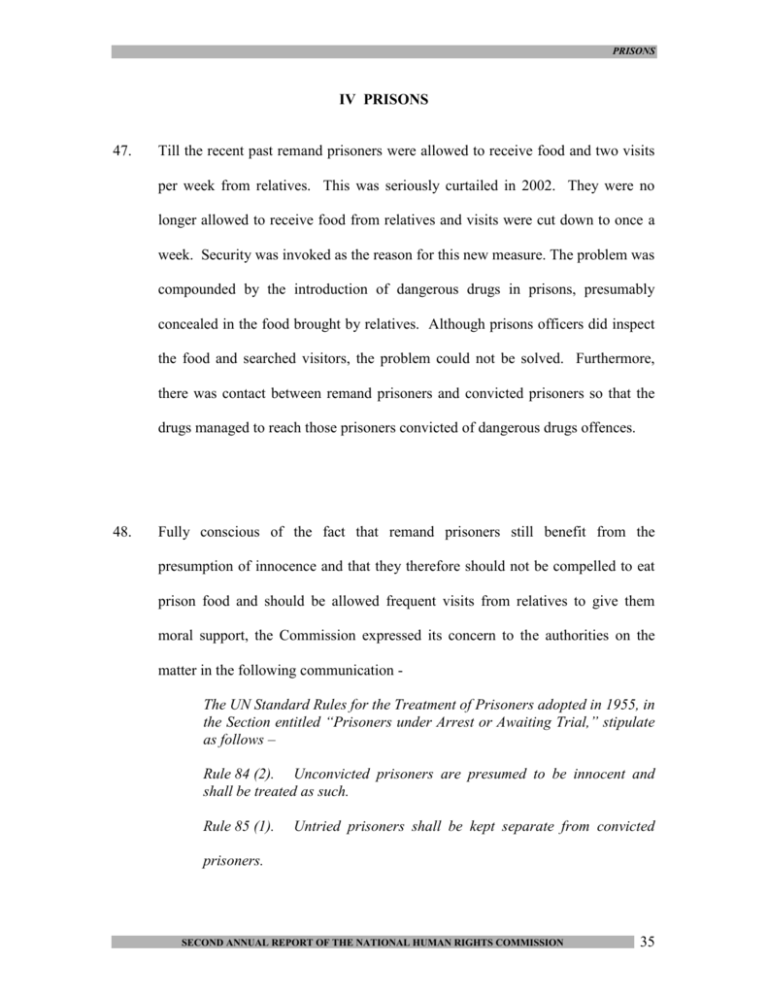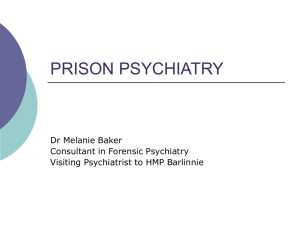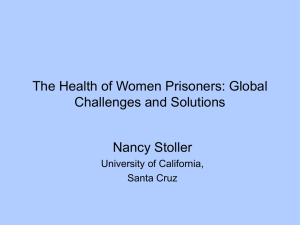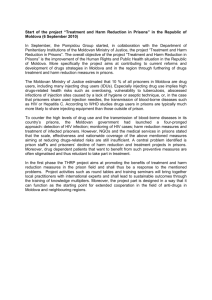iv prisons - National Human Rights Commission
advertisement

PRISONS IV PRISONS 47. Till the recent past remand prisoners were allowed to receive food and two visits per week from relatives. This was seriously curtailed in 2002. They were no longer allowed to receive food from relatives and visits were cut down to once a week. Security was invoked as the reason for this new measure. The problem was compounded by the introduction of dangerous drugs in prisons, presumably concealed in the food brought by relatives. Although prisons officers did inspect the food and searched visitors, the problem could not be solved. Furthermore, there was contact between remand prisoners and convicted prisoners so that the drugs managed to reach those prisoners convicted of dangerous drugs offences. 48. Fully conscious of the fact that remand prisoners still benefit from the presumption of innocence and that they therefore should not be compelled to eat prison food and should be allowed frequent visits from relatives to give them moral support, the Commission expressed its concern to the authorities on the matter in the following communication The UN Standard Rules for the Treatment of Prisoners adopted in 1955, in the Section entitled “Prisoners under Arrest or Awaiting Trial,” stipulate as follows – Rule 84 (2). Unconvicted prisoners are presumed to be innocent and shall be treated as such. Rule 85 (1). Untried prisoners shall be kept separate from convicted prisoners. SECOND ANNUAL REPORT OF THE NATIONAL HUMAN RIGHTS COMMISSION 35 PRISONS Rule 87. Within the limits compatible with the good order of the institution, untried prisoners may, if they so desire, have their food procured at their own expense from the outside, either through the administration or through their family or friends. Otherwise, the administration shall provide their food. Rule 89. An untried prisoner shall always be offered opportunity to work, but shall not be required to work. If he chooses to work, he shall be paid for it. Rule 92. An untried prisoner shall be allowed to inform immediately his family of his detention and shall be given all reasonable facilities for communicating with his family and friends, and for receiving visits from them, subject only to restrictions and supervision as are necessary in the interests of the administration of justice and of the security and good order of the institution. We have been apprised that, in view of the fact that hard drugs are circulating in prisons, it has been decided that remand prisoners should not be allowed to receive food from outside. Furthermore, the number of visits they are allowed to receive has been reduced from two to one per week. However, we are given to understand that there does not exist in the prisons a system of visits by appointments. The view has been expressed that if an orderly system of visits, with prior appointments being given, is set up and limited to two persons per visit, it should be possible to reintroduce the practice of two visits per week, especially if the visitors are not allowed to bring food for the detainees. It is suggested that ways and means could be found to keep remand prisoners separate from convicted prisoners. Remand prisoners could be asked to volunteer to work in remand prisons instead of calling upon convicted prisoners to do so, as is happening at present in G.R.N.W. Prison. If possible rule 89 should be applied. 49. A complaint was lodged by an untried prisoner detained in the high security prison of La Bastille at Phoenix. Extracts of findings were as follows - SECOND ANNUAL REPORT OF THE NATIONAL HUMAN RIGHTS COMMISSION 36 PRISONS 1. The complaint lodged on 19 June 2002 was to the effect that there has been a breach of Section 7 of the Constitution in that the conditions of detention of Complainant in the top security prison of La Bastille in Phoenix constitute inhuman treatment and degrading punishment and that there has been a breach of Prisons Regulations. 2. It was averred that complainant who is on remand for a murder case has been in solitary confinement for a period of more than 18 months. The particulars of the complaint were as follows – (a) Constant detention in a very small cell; (b) No proper ventilation; (c) Only 60 minutes of permission to walk; (d) A bulb of 100 watts constantly on for 24 hours per day non-stop over the head of detainee; 3. (e) Two cameras on the prisoner; (f) No prayer facilities (presence of toilet); (g) No Jummah on Friday; (h) No newspaper/Radio/TV; (i) No proper bedding facilities; (j) Food delivered through aperture without proper hygiene; (k) No proper place to keep clothes/or permission to change clothes; (l) No facilities at all if one is sick or suffering even from a mild headache; (m) No indoor activities or permission to exercise oneself; (n) Toilet in the same cell and sometimes no water to flush. When we visited La Bastille on 27 June 2002 and met complainant, his main grievances were that the light in his cell was always on, there were two cameras in his cell, his bed sheets were not changed regularly, he was not allowed to exercise sufficiently and he was not given facilities to keep his clothes which he had to place on his bed. He also pointed out a damp spot at ceiling level in one corner of his cell. SECOND ANNUAL REPORT OF THE NATIONAL HUMAN RIGHTS COMMISSION 37 PRISONS On our visit we found that the surroundings and his cell were clean. There was no foul smell and the tap had running water. The Commission did not find the complaints justified. The conditions were reasonable in the circumstances as being those applicable in a maximum security prison. 50. 51. Another prisoner complained of (a) systematic torture; (b) lack of facilities for outdoor exercise; (c) no opportunity to purchase food of his own choice (e.g. dholl puri). We found some justification in the complaint about lack of facilities for outdoor exercise. In fact he was only allowed free access to a small indoor corridor adjoining his cell for exercising. We have since been informed that work is being undertaken on the premises to provide a secure yard to allow him to exercise outdoors. 52. Concerning his lack of opportunity for purchasing food of his choice, it has been explained to us that restrictions had to be applied for security reasons and for his own safety on account of the risks of poisoning. 53. One person died while on remand at Beau Bassin prisons on a provisional charge of swindling. He was allegedly beaten up by a prisons officer and co-detainees because he had been demanding money in the name of the prisons officer from the relatives of the co-detainees. After ensuring that the police had conducted an enquiry in the case and that the suspects had been charged, the NHRC did not SECOND ANNUAL REPORT OF THE NATIONAL HUMAN RIGHTS COMMISSION 38 PRISONS deem it necessary to conduct a separate enquiry. The matter will follow its course to be decided upon by the Director of Public Prosecutions and the appropriate Court. It is necessary to draw attention once again to the risks when remand prisoners and convicted prisoners are allowed to mix. 54. During the year the Commission visited the Bail and Remand Court (BRC) where the Magistrate remands prisoners to jail through video-conferencing. The system saves time and dispenses with the need of conveying the prisoners to Court. Undoubtedly, the prisoners would have welcomed the opportunity of being taken out of jail and being conveyed to Court where they have the chance of meeting their relatives (who sometimes are allowed to bring them food). This practice had to be stopped because of abuses in some cases. At the BRC, most detainees are remanded to jail pending the completion of the enquiry. Complaints have been received from the prisoners that the video proceedings take place too quickly and they have no time to make representations to the magistrate. Or else, they do not quite understand what is happening. However, in open Court also, the proceedings are held fairly quickly. Prisons authorities at Beau Bassin and Grand River North West have been told that before their first appearance in front of the BRC, prisoners must in all fairness be properly briefed about the video conferencing facilities and about their right to, and the manner in which they must, address the Court. SECOND ANNUAL REPORT OF THE NATIONAL HUMAN RIGHTS COMMISSION 39 PRISONS 55. A Special Detention Centre has been built at Moka by the police to house detainees instead of keeping them in individual police station cells. It had not become operational by the end of 2002. The Commission visited the Centre while it was under construction and made certain suggestions to improve conditions of detention. The provision of cameras in the cells of persons at risk was recommended to watch their movements. As pointed out in the Chapter on the Police, regarding death in police cells, it is highly risky to keep drug addicts in police cells. A 24hour watch is necessary in such cases. 56. The scheme for the transfer of convicted prisoners of foreign nationality had not been fully implemented by the end of 2002. One British prisoner convicted for dealing in drugs was transferred home. The Indian authorities have not yet given official clearance for the transfer of Indian prisoners. 57. The Community Service Order Act was passed in July 2002 and proclaimed in November the same year to provide for community service as an alternative to imprisonment when a Court convicts a person to a term of imprisonment of less than 2 years or for non-payment of a fine of not more than 10,000 rupees. Prison sentences have not always proved to be an effective deterrent. It is hoped that SECOND ANNUAL REPORT OF THE NATIONAL HUMAN RIGHTS COMMISSION 40 PRISONS community service orders will help to reform first offenders. The conditions of an order are as follows 6(1) The Court shall, in a community service order, specify – a. the day on which work must commence, not being a day later than 10 days from the making of the order, or from the date of release of the convicted person if he is detained at the time of the making of the order; b. the times at which the work must be performed; c. the place where the convicted person shall perform the work; d. the place where the convicted person must reside; e. the name and location of the government department, local authority, statutory body or any charitable or voluntary institution or organisation as may be prescribed for which the convicted person must work; f. the name and designation of any particular community service officer under the supervision of whom the convicted person must work; g. whether the convicted person must avoid contact with the victim of the offence with respect to which he is convicted, or any other person; h. whether the convicted person shall – (i) abstain from using any offensive weapon (ii) meet the needs of his dependants; (j) such other condition as the court deems appropriate. SECOND ANNUAL REPORT OF THE NATIONAL HUMAN RIGHTS COMMISSION 41







